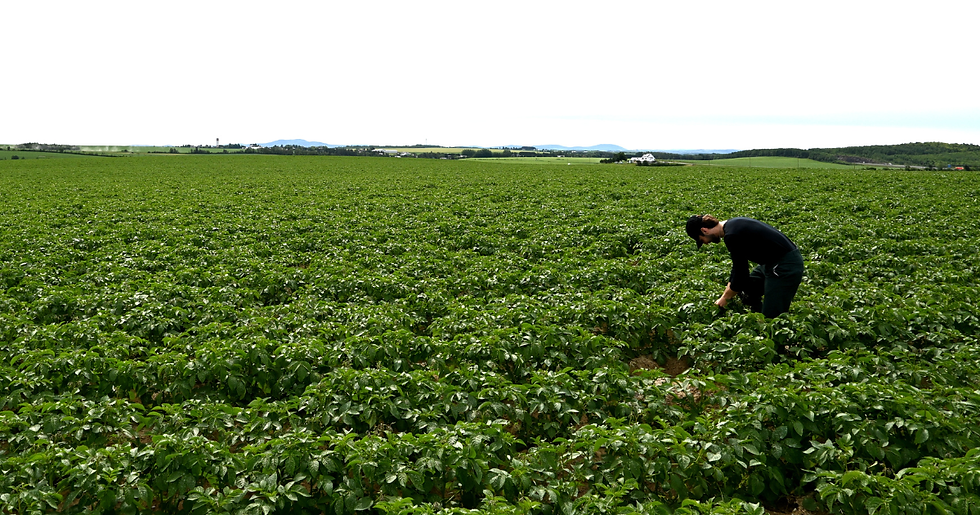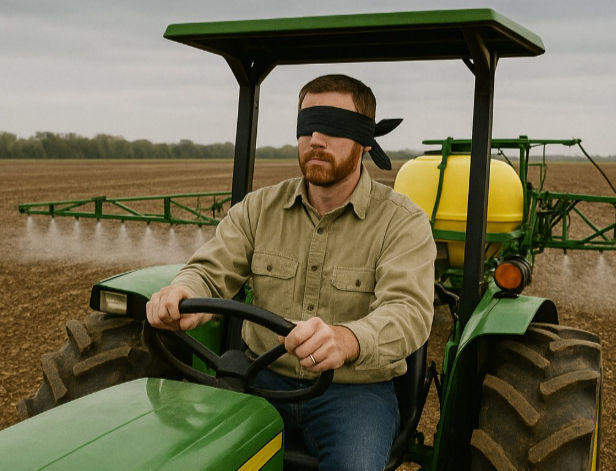Agronomists Unlock Instant Crop Nutrient Insights with Debut of Picketa LENS in 2023 Growing Season
- Alexa Campbell

- Dec 18, 2023
- 4 min read
After positive response from potato industry, Picketa is expanding to corn
In 2023, we introduced the Leaf-Evaluated-Nutrient-System (LENS), a real-time plant tissue analysis tool that's changing the game for farmers and agronomists. This year marked a significant milestone for us as we commercialized the LENS, making it accessible to growers worldwide.
In its third year of development, the LENS responds to challenges faced by agronomists with timely and accurate data on nutrient uptake, assisting in managing input and fertilizer costs, and adapting to varying crop conditions. The LENS aims to tackle these issues, improving the information that agronomists have on-hand during key moments of the season.
Prior to the LENS, agronomists conducted foliar analysis with time-consuming laboratory protocols, impacting service quality to growers as they waited days to weeks for results, and overall creating inefficiencies. Delayed results often led to under or over-fertilization, which ultimately impacts the success of the growers.
Growers Discover: Picketa LENS aims to take the guess work out of field work
Seeking a better way to access crop nutrient insights and optimize resource management, some leading agronomists trialed the Picketa LENS, a technology offering full nutrient readings for instant agronomic feedback. This innovation empowers growers and agronomists with real-time insights into plant nutrient content. The result? Cost savings in their operations, quick and clear advice to growers, timely decision making, and improved crop quality.
The LENS was integrated quickly into their existing crop consulting services, many of which switched from offering traditional lab tests to this new solution. This year was the first time the technology was productized with an intuitive design, making it easy for anyone to operate in the field. Over 3,300 leaf tissue analysis scans were conducted, saving each customer an estimated 7000 dollars and approximately 100 hours of labor this year. So far, the LENS has been deployed over 40,000 acres of farmland across four continents.
Success stories include Taber Home and Farms, who have noted that with the LENS they’re able to get tissue sample information back in a format that is quick, reliable, and easy to understand.

Lloyd from Taber Home and Farms describes the LENS as a "lie detector" for plants, helping ensure accuracy in understanding their true condition. The tool has revolutionized their management strategies, providing valuable insights for fertilizer applications and overall sales.
"This product allows us to validate and verify the accuracy of our crop protection, making it an invaluable asset for showcasing their effectiveness," Lloyd adds. The LENS tackles critical challenges by providing an effective on-site alternative to traditional laboratory methods. Real-time insights enable data-driven decisions, fostering improved yields, enhanced plant health, and early disease detection.
Across the pond, Branston Ltd, has been using the LENS in their Net Zero Project to reduce their carbon footprint and provide the plants with only what they need at the right time.
According to Andy Blair, Agronomist at Branston Potatoes, “We've gathered data from our growers that have highlighted the key areas of carbon and CO2 and their relative size to the proportion of the crop. Growing the crop eq to 5 liters per kg of potatoes, fertilizer and chemicals 22 liters, storage is 8 liters and diesel usage is 9 liters.”

Being the largest contributor to emissions, it is key that producers can optimize fertilizer applications depending on the needs of their crops.
“We're also trialing different varieties to see how different varieties perform at low levels of nitrogen.”, Andy explains in their 2023 summary video,” Throughout the season we've been assessing these crops and we're starting to see some really distinct differences between the different trials. We've been using the Picketa equipment to carry out the in-field leaf analysis that's really giving us the nutrient level of the crop at that moment in time. This allows us to feed the crop what it needs when it needs it, without having to send samples off to the lab for analysis.”

The LENS accomplishes this using a technique called Chemometrics, which involves studying how plant tissues reflect light over a wide range of wavelengths. This data is then processed by machine learning algorithms to evaluate the chemical properties of the plant tissue.
The complex science of the LENS is hidden behind a user-friendly app, allowing anyone to easily analyze plants in the field without dealing with the complicated aspects. The system works by comparing samples from fields with a big database of leaves analyzed before. This helps identify patterns related to various plant states.
William Houde Ltd, an independent agriculture supply and service provider based in Quebec, has seen immense change in their ability to show the effectiveness of their products. “Growers are impressed with the speed at which the results are available, we have been able to show the effectiveness of our products and sell higher volumes early into the season,” They’ve noted.
Building on this year’s successful launch, we plan to listen to growers and expand the LENS to support more crops. We’ve started conducting trials on six additional crops and are currently conducting field trials in South Africa and Chile over the winter to broaden its capabilities. Although initially focusing on potatoes, our team is actively calibrating the LENS for additional crops, including corn, canola, onions, and beyond.
Expanding Support: Picketa LENS will now support corn in addition to potato
We are thrilled to officially announce the upcoming release of corn leaf analysis with the LENS, scheduled for spring 2024. We are gearing up to reach the US potato and corn markets in the coming years, aiming to bring the benefits of this technology to even more farmers.
CEO Xavier Hébert-Couturier emphasizes, "Ever since we started looking into a way for growers to get information about their crops instantly, we’ve heard from growers and agronomists of all types of crops that this would be a game-changer for their businesses."

For more information or to secure your LENS unit for the 2024 season, visit www.picketa.com/contact. Limited units are available, so early contact is recommended.
Stay informed with company and industry news by signing up for the Picketa newsletter, Fieldnotes.
About Picketa Systems:
Founded in 2020, Picketa Systems introduced the LENS, revolutionizing plant tissue analysis. The LENS estimates the nutrient content of 13 key macro and micronutrients, facilitating data-driven decisions for precise nutrient management. Recognized with the Most Innovative Startup award at the 2023 Innovate NB Awards, Picketa Systems is committed to transforming agriculture through responsible resource management.






Comments